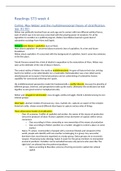Readings ST3 week 4
Collins; Max Weber and the multidimensional theory of stratification
(pp. 81-92)
Weber was politically involved from an early age and in contact with two different political forces,
each of which was in its own way concerned with the growing power of socialism. For all his
opposition to socialism as a political program, Weber nevertheless learned a great deal of
substantive sociology from Marx and Engels.
Weber’s main theme = capitalism (just as Marx).
Marx about capitalism concerned about economic laws of capitalism, its crises and future
breakdown
Weber about capitalism concerned with the background of capitalism, how it came into existence
in the first place.
Talcott Parsons named him a kind of idealist in opposition to the materialism of Marx. Weber was
seen as the defender of the role of ideas in history.
The central reality of Weber: the world as multidimensional. He gave all factors their due, striving
hard to be neither a one-sided idealist nor a materialist. Rationalization was a two-sided sword,
simultaneously an increase in formal procedures and an undermining of substantive human
capability for consciously achieving one’s goals.
His multidimensional perspective made him fundamentally a conflict theorist, because the plurality of
different groups, interests, and perspectives make up the world. Ultimately the world does not hold
together as one great social or metaphysical unity.
Weber and struggle for domination: class struggle, political struggle. World is divided among its own
interest groups.
Ideal types: abstract models of bureaucracy, class, markets etc. captures an aspect of the complex
historical reality, always several different ideal types to capture various sides of things.
Three-dimensional model of stratification:
- Class economy. Conflict of capitalist and worker: the owner of the means of production
versus the producer of labor; finance capitalist versus borrowers of capital; sellers versus
consumers
o Class according to Marx: ownership or non-ownership of the means of production
o Class according to Weber: position on a market; struggle to control a place on some
market
- Status culture. Communities of people with a common lifestyle and viewpoint of the
world, people who identify with one another as belonging to a group. Any successful,
dominant class must become organized as a status group. Status groups are an economic
weapon. Possessing status ideology makes it easier for the gorup members to monopolize
economic positions. Outsiders can be excluded because only persons who seem like ‘the
right kind’ are allowed into the preferred positions.
o Status according to Bourdieu: process of turning economic capital into cultural
capital
, - Party political, power groups. Struggle among political factions. Politicians and their
maneuvers are not simply reducible to the struggles of economic classes or of status groups
because they have economic interests of their own. The state is an organization that can
dominate all other organizations. States have enemies, namely each other. Weapons of the
state: it is armed, it is legitimate. It makes most people within its borders feel they are
members of a single status group: the nation. Legitimacy can be generated through charisma
of forceful leaders, the tradition of hereditary arrangements, and the rational-legal authority
of constitutional law.
o Fiscal crisis of the state: the state tries to buy legitimacy by providing welfare
services at the same time that it is being milked by the monopoly sector of the
economy
Economic struggle is much more multisided than Marx had shown: classes become subdivided into
status groups.
Collins; classes, class cultures, and inequalities: the conflict theorists
(pp. 102-108)
Social class positions exist, however long people may happen to be in any one of them.
Inside the complex bureaucracies of modern society, the main social dividing line has been between
workers and managers. The managers are not actually property owners at all.
Ralf Dahrendorf proposed a revision of Marx: the major class dividing line is between power groups,
between those who give orders and those who take orders. Dahrendorf took the Marx/Engels
conception of class and generalized it in a Weberian direction, making Weber’s conception of power
conflict more basic.
Organizations and classes are just different ways of slicing up the same social reality; classes always
have their basis as parts of some organizations, and organizations create classes and class conflict.
Power-conflict:
- Goffman model of social life as a series of frontstages and backstages, a kind of theatre of
everyday life. The persons who control the frontstage turn out to be the order-givers,
whereas those who are merely compliant audiences for these official performances are the
order-takers.
- Lenski distribution of wealth, power and privilege determine whether a society will have a
large or small degree of economic inequality
Class mobilization and political conflict
Seymour Martin Lipset: class influence on politics. Calls elections ‘the democratic class struggle’.
Social classes have been among the most essential dividing lines in explaining how people vote,
although the other dimensions that also predict political attitudes are often versions of Weber’s
status groups. The higher social classes tend to favor the status quo and the maintenance of
property, whereas the lower social classes tend to favor reforms and economic redistribution.
Though the model is generally correct, there have nevertheless been some major refinements in it.
Marx and Engels were interested in a revolutionary working class.
Early phase of capitalism: the capitalist market itself tends to mobilize social classes. Hence, it made a
great deal of difference whether peasants marketed their own crops or whether this was done by





